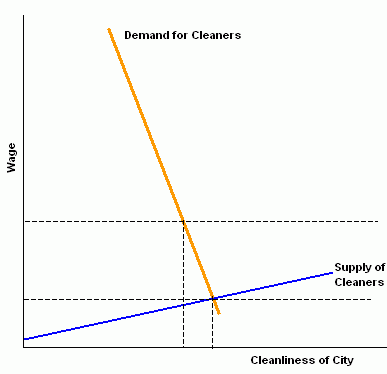Matt made a good point. It's often difficult to work out someone's value to a business. However, the theory is that if someone is working for less their the value of their labour another business will come along and offer them more. It never works like this, because there are so many cleaners and not enough cleaning jobs. And people can't shift out of industries into other industries that easily.
But if labour markets were fluid, and no one was forced to work to survive, then efficient market theory would suggest that everyone would earn the equivalent of what they are worth to a society. And what they are are worth is the maximum society is willing to pay to have something done. Even if a business doesn't think cleaning is valuable, the government does and so it has a value.
If the costs of that cleaning get too high, then businesses will start going bankrupt or prices will go up. Eventually the government will decide that cleaning isn't important enough and will remove the regulation. But I'm sure there are plenty of businesses in Australia that would be willing to pay someone $100,000 a year to get them to clean somewhere. Lucky for them they won't ever have to because there are enough cleaners that prices are continually bid down.
But if someone would be willing to pay $100,000 a year for something, and someone else is willing to accept minimum wage (or less) to do it, who is to say what that person should be paid? If someone is paying them to do it, then they are definitely worth it. Bob Snuffles might not be worth minimum wage to his employers, but he's worth it to society. It we want clean floors then we should pay for them.
I reckon that the supply and demand for cleanliness looks something like this.

Cleaning is pretty important, so I'd reckon that businesses wouldn't reduce their consumption that much with price rises. Which is why the orange line is so steep. But the blue line is really unsteep because there are lots of cleaners, they don't have many other skills, and it's probably hard for them to get other skills. And most importantly, they have to work to survive, so they'll take what they can get.
The blue line is very much determined by the sort of society we've built. It's not really the fault of cleaners that they get hardly any of the value of their cleaning. And it's not really anything clever that businesses have done that means they get almost all the value of their cleaning. In this instance minimum wage is trying to make sure workers have enough to live on, but also to divide the value a bit more evenly.
By the way, that diagram doesn't relate particularly to my previous post about minimum wage. That was about what doesn't get shown on these diagrams.
I don't think there is an ethical line. Why are sweat shops unethical when poverty wages in Australia aren't? Is it the degree of oppression that determines whether or not it is ethical? Poor workers in Australia are in a very similar position to sweat shop workers. Sure, they're willing to work for that wage - no one is forcing them. But if you give all the power to employers, then I'm almost sure that the majority of people will be working on wages that are just enough to feed them and their children. Which is economically efficient? You're getting the right amount of output, and allocating your resources to all the right places. But then crime goes up, and you start having social revolutions. I'm all for social revolutions, but unlike those Marxist fellows I don't think that oppressing the poor is a good way to create one.
I strongly believe in the social contract. I think that we're only obliged to participate in the society as long as it lives up to the contract of distributing the benefits of community around. And when you get a bunch of people who've decided not the participate in society, it tends to get very bloody and crazy. You don't even have to use words like equity at all. I look at redistribution of resources as an investment in avoiding a class war. It's perfectly rational, and has nothing to do with compassion at all.

Comments
No comments yet.
Leave a comment